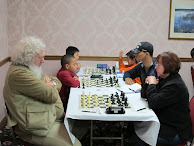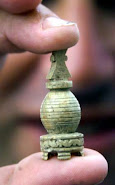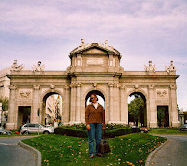Saturday, September 8, 2007
Diana of Ephesus
Yes, I was one of those who cried - sobbed - as I watched on television from my bed at 3 in the morning the long funeral procession, memorial service for Princess Diana and then the removal of her coffin from London. About 5 a.m., my telephone rang - it was my girlfriend Barb, sobbing too. We comforted each other as best we could over the telephone for more than an hour, and then said goodbye, to continue our observation of televised grief.
It didn't occur to me to do a post about the anniversary of Princess Diana's death (on August 31) until I came across this article tonight. I found it particularly poignant.
Diana of Ephesus
A Spiritual Journey (1)
BY MIKE AWOYINFA [ mikeawoyinfa@sunnewsonline.com ]
Saturday, September 8, 2007
She was the goddess of the media age, a goddess of the modern world. A goddess of beauty. A goddess of love forsaken. A goddess whose image captivated the world, giving birth to the word paparazzi—the name for the press photographers who hunted her until they finally killed her in the name of love. A strange love. A cruel love that defies any rational explanation. How can it be that the thing you love is the thing you kill?
Ten years after we killed her, she is still as fresh as ever in our minds. Popular as no queen ever has even in her grave. Revered as no saint ever has in recent and past memories.
Ten years after, and the tears are still falling. Everybody remembers when Diana died. Everybody cried. Diana is still hot news. Diana’s story is still being pursued in the world after. Everybody has a personal Diana story.
I am one of those lucky few who met Diana. As a journalist on the Harry Brittain Commonwealth Fellowship programme, entering Britain for the first time in 1985, I met Diana face to face and shook her hand one evening when the ten Commonwealth journalists were being introduced to her. As at that time she hadn’t lost her love. Her Prince was still by her side. The Prince who famously said “whatever love means” when asked whether he was truly in love with Diana.
On that historic night at a dinner in London, I wanted to be photographed shaking Diana, but that kind of photography would not be allowed. The security agents around her politely told us that photographing her in that setting was forbidden. That is how I lost the once-in-lifetime opportunity of being photographed with this goddess of our time. But enshrined in my mind, my heart and my soul is the spiritual photograph of me shaking Diana. No one can take that away from me. No virus can wipe that away from the hard disk of my soul.
Many days and weeks after shaking Diana’s hand, I refused to wash my hands. I wanted my people back home in Nigeria to shake the hand that shook the great Diana’s hand. If it had been in this era of GSM camera phones, there is no way anybody would have stopped me from capturing Diana on my handset. I would have done it secretly. I would even have commissioned somebody to secretly video me with my phone. The handset has revolutionized journalism today, such that everybody with a camera phone is a paparazzo—an aggressive photojournalist armed to shoot and kill Diana.
On this strange and serene Turkish morning, I was a journalist armed with a notebook and a real camera, combing ancient cemeteries in search of another Diana. A Diana that was once worshipped. A Diana for whom a temple was built and people flocked in from all of Asia to worship her. Her temple was in the ancient city of Ephesus. Hence the name Diana of Ephesus. Or Diana of the Ephesians. Diana’s temple was listed among the Seven Wonders of the ancient world.
I was in Ephesus searching for the temple of Diana. In Greek mythology Diana was called Artemies. She was the twin sister of Apollo and the daughter of Zeus and Leto. According to legend, she helped her mother to deliver her twin sister underwater, hence she became the goddess of fertility. Barren woman came into her temple in search of the fruit of the womb. She was depicted as the goddess of the hunt, armed with a bow and arrows. Like Diana of Wales, she was hunted down and killed by a new religion. The religion of Christianity spearheaded by Apostle Paul.
Tongue of angels
In the Acts of the Apostles, (Acts 19:28), the story of Diana is told, about how Ephesian silversmiths led by a man called Demetrius used to make huge profit from selling souvenirs of Diana to worshippers and pilgrims who kept them as talisman. Then came Paul, the “Jew of Tarsus”. Paul, the “chief of all sinners” who transformed from Saul to Paul on the road to Damascus. Paul, the persecutor of Christians who became a soldier of Christ. Paul who wrote that beautiful love poem in Ephesus which reads: “Though I speak with the tongues of angels, and have not love, I am become as a sounding brass, or a tinkling cymbal.”
Paul’s new religion instantly killed off the business of Diana-mania which was a major industry in Ephesus. And such was the anger and jealousy of the smiths that they organized Area Boys and went on rampage. There was a big riot and a great confusion in the city of Ephesus because they had been thrown out of business by the new faith which preached that “the gods made with hands are not gods.”
In their fits of jealousy and selfish anger, the rioters shouted with one voice the now, famous phrase: “Great is Diana of the Ephesians!” Eventually, the rioters were appeased.
We are told in Acts 19:35 that “when the town clerk had appeased the people, he said, Ye men of Ephesus, what man is there that knoweth not how that the city of the Ephesians is a worshipper of the great goddess Diana, and of the image which fell down from Jupiter?”
Due process
From this episode, we can learn that even in the Bible, there is the respect for due process, rule of law and the supremacy of the court. And this is based on what the town clerk said while addressing the rioting hooligans. He said: “If therefore Demetrius and the craftsmen with him have a complaint against anyone, the courts are open, and there proconsuls; let them bring charges against one another. But if you seek anything further, it shall be settled in the regular assembly. For we are in danger of being charged with rioting today, there being no cause that we can give to justify this commotion.”
On this spiritual journey to Ephesus, we visited the site of the Diana temple which is now in ruins. Diana is dead and in ruins, but Diana-mania continues from one generation to another. Like the Ephesians silversmiths, the world is still shouting and wailing: “Great is Diana.” They are wailing for the Diana of Wales who dropped from heaven and extinguished like a candle in the wind in a Paris car crash ten years ago.
(The story of my journey to Ephesus continues next week)
Subscribe to:
Post Comments (Atom)



































No comments:
Post a Comment